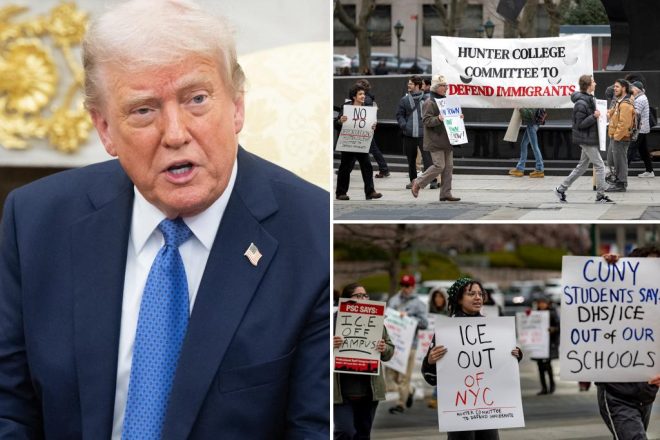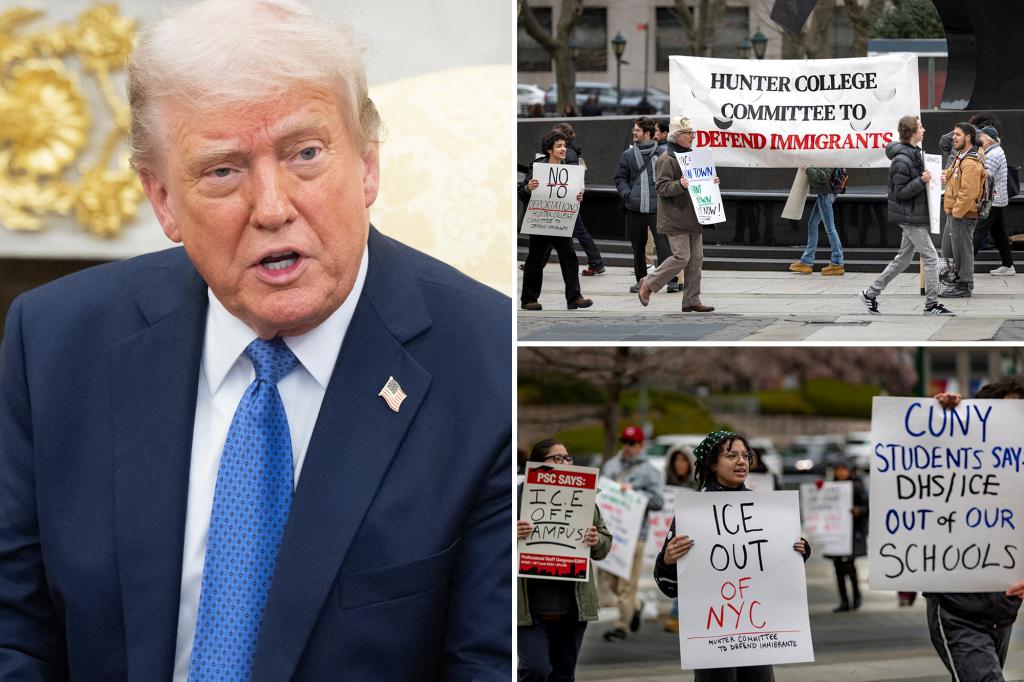
Overview of Visa Revocation for Students with Criminal Records
In an unprecedented move, the trump administration took significant action by revoking 4,000 visas belonging to international students with criminal records involving serious offenses such as assault and robbery. This decision, reported by the New York Post, reflects a broader strategy aimed at tightening immigration policies and enhancing national security measures. The revocation of these visas raises critical questions about the balance between maintaining educational opportunities for international students and ensuring public safety.
Understanding the Visa Revocation Policy
The visa revocation policy implemented by the Trump administration focuses on students who have been convicted of violent crimes, including assault and robbery. The decision is part of a larger crackdown on immigration violations and is intended to deter criminal activity among international students. By revoking visas for those with criminal backgrounds, the administration aims to protect American communities while also sending a message about the importance of adhering to U.S. laws.
Implications for International Students
This visa revocation policy has far-reaching implications for international students studying in the United States. For students who have committed offenses in the past, the sudden loss of their visa can disrupt their education and lead to deportation. This creates a climate of uncertainty for many students who may fear repercussions from their past actions, even if they have since rehabilitated and integrated into society.
The Broader Context of Immigration Policy
The Trump administration’s approach to immigration has been characterized by a focus on law and order. This policy aligns with other measures taken to restrict immigration, including increased scrutiny of visa applications and heightened enforcement against undocumented immigrants. By revoking visas for students with criminal records, the administration reinforces its stance that public safety is paramount and that individuals with a history of violence pose a risk to society.
- YOU MAY ALSO LIKE TO WATCH THIS TRENDING STORY ON YOUTUBE. Waverly Hills Hospital's Horror Story: The Most Haunted Room 502
The Reaction from Educational Institutions
Educational institutions have expressed concern over the potential impacts of such policies on their international student populations. Many universities rely on international students for tuition revenue and cultural diversity. The revocation of visas for students with criminal records could discourage prospective international students from applying to U.S. institutions, fearing that their past mistakes might jeopardize their educational aspirations.
Public Safety vs. Educational Opportunities
The debate surrounding this visa revocation policy revolves around the tension between public safety and educational opportunities for international students. Advocates for stricter immigration policies argue that the safety of American citizens must come first, while opponents contend that punishing students for past mistakes could hinder their futures and contributions to society. This dynamic creates a complex landscape for policymakers seeking to strike a balance between these competing interests.
Conclusion
The Trump administration’s decision to revoke 4,000 visas for international students with criminal records marks a significant shift in immigration policy. While the intent is to enhance public safety, the implications for affected students and educational institutions warrant careful consideration. As the discussion surrounding immigration continues, it is essential to weigh the importance of maintaining secure communities against the need to provide opportunities for rehabilitation and education for individuals seeking a fresh start in the United States.
In summary, the revocation of visas for students with criminal records highlights the complexities of immigration policy and its impact on both individual lives and broader societal values. As the landscape of U.S. immigration continues to evolve, ongoing dialogue and analysis will be crucial in navigating these challenging issues.

Trump administration revokes 4,000 visas for students with criminal records for assault, robbery https://t.co/xYfcbwCgf6 pic.twitter.com/Ad6izi0mlI
— New York Post (@nypost) April 28, 2025
Trump Administration Revokes 4,000 Visas for Students with Criminal Records for Assault, Robbery
The decision by the Trump administration to revoke 4,000 visas for students with criminal records related to serious offenses like assault and robbery has sparked intense discussions. This move raises numerous questions about the balance between national security and the educational aspirations of international students. Let’s dive into the details of this controversial action and explore its implications.
Understanding the Visa Revocation Policy
In April 2025, the Trump administration announced a policy aimed at tightening immigration controls, particularly concerning students in the United States on temporary visas. The policy specifically targeted students who had criminal records for serious offenses, including assault and robbery. This action was part of a broader strategy to ensure that individuals who pose a threat to public safety are not allowed to stay in the U.S.
The administration argued that revoking these visas would protect communities and uphold the integrity of the immigration system. However, critics raised concerns about the fairness of such blanket policies and the potential for discrimination against certain groups of students. The impact of this decision is significant as it affects thousands of young individuals who came to the U.S. for educational opportunities.
The Implications for Affected Students
For the students whose visas were revoked, the implications are profound. Many of these individuals may have already invested time and resources into their education in the U.S., only to find themselves facing the possibility of deportation. The emotional toll of such a situation cannot be overstated. These students often have dreams of contributing to society and advancing their careers, but their futures now hang in the balance due to past mistakes.
Moreover, the policy raises questions about rehabilitation and second chances. Should students who have committed crimes, served their time, and sought to reform themselves be denied the opportunity to pursue higher education? Many argue that education is a pathway to redemption and that punitive measures should not overshadow the potential for growth and change.
Public Reaction and Debate
The reaction to the revocation of these visas has been mixed. Supporters of the policy argue that it is a necessary step to ensure the safety of American communities. They claim that the U.S. should not be a refuge for individuals with violent pasts, especially those who may disrupt the educational environment.
On the other hand, opponents view this policy as overly harsh and counterproductive. They argue that it unfairly targets vulnerable populations and fails to consider the complexities of individual circumstances. Many advocacy groups have called for a more nuanced approach that takes into account the context of each case rather than a blanket revocation.
Legal Challenges and Future Considerations
As expected, legal challenges have emerged in response to the visa revocation policy. Several organizations have stepped forward to advocate on behalf of the affected students, arguing that the policy violates principles of due process. They assert that each case should be evaluated on its own merits, rather than being subjected to a sweeping policy that ignores individual circumstances.
The outcome of these legal battles will be crucial in determining the future of immigration policy in the U.S. How the courts respond to these challenges can set important precedents for how similar cases are handled in the future.
The Role of International Students in the U.S. Education System
International students have long been a vital part of the U.S. education system. They bring diversity, cultural perspectives, and economic contributions to universities across the nation. The presence of these students enriches the academic environment and fosters global understanding among young people.
With policies like the revocation of visas for students with criminal records, there is a risk of discouraging international students from pursuing education in the U.S. This could lead to a decline in enrollment numbers, ultimately affecting the financial health of universities that rely on tuition from international students.
Moving Forward: A Call for Balanced Policies
As the debate continues, it’s clear that there needs to be a balance between ensuring public safety and providing opportunities for education. Policymakers should consider more tailored approaches that focus on rehabilitation rather than outright exclusion. This could mean creating pathways for students to appeal visa revocations or developing programs that support their reintegration into society.
Engaging with community leaders, educators, and advocacy groups can help create a more inclusive policy framework that recognizes the potential for growth and change. After all, the ultimate goal should be to foster a society that values both safety and second chances.
Conclusion: The Importance of Dialogue
The revocation of 4,000 visas for students with criminal records underscores the complexities of immigration policy in the U.S. It highlights the need for an ongoing dialogue about how best to balance national security with the educational aspirations of individuals. As this issue continues to unfold, it’s essential for all stakeholders to engage in constructive discussions to shape a future that reflects the values of justice, opportunity, and community safety.
For those interested in following the developments surrounding these visa revocations, staying updated through reliable news sources and engaging in community discussions can help foster awareness and understanding on this critical issue.
